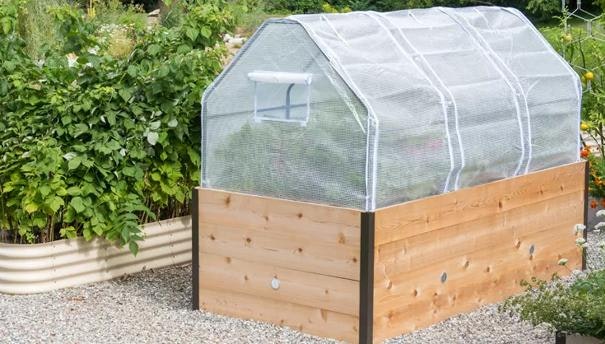 Bluberries growing in a 3 x 6 ft. cedar raised bed with rustproof aluminum corners.
Bluberries growing in a 3 x 6 ft. cedar raised bed with rustproof aluminum corners. Blueberries for Raised Beds (Northblue and Northland) produce abundant fruit and they cross-pollinate.
Blueberries for Raised Beds (Northblue and Northland) produce abundant fruit and they cross-pollinate.Dreaming of a backyard berry patch? An asparagus bed? Start with a raised bed.
A raised bed isolates the perennial crop from invasive weeds and grasses. Wind-blown seeds can get into the soil, of course, but the real enemies for these crops are grasses and weeds that creep into the plantings. Berries and asparagus have shallow roots that don't compete well with weeds and can be damaged by aggressive weeding tools.
Some weeds and grasses are aggressive and will attempt to climb up and over the edge of a raised bed. Ground ivy or creeping Charlie (Glechoma hederacea) is a common lawn weed that has no problem making it up, over and into an 8"-high raised bed. You can help hold it at bay by creating a 2 ft.-wide mulched strip around all four sides of the raised bed. Put down landscape fabric or black plastic sheeting and then cover that with bark mulch, chopped leaves or straw.
Another advantage of raised beds is that you can start with soil that is specifically tuned to the needs of the individual plants. Blueberries, for example, thrive in acidic soil (in the range of pH 4.0-5.5). To prepare the ideal soil conditions, test the soil pH first. You can add elemental sulfur at planting time and then top-dress your blueberries each year after they bloom with an acidic fertilizer.
Asparagus and rhubarb both want rich soil amended with lots of compost or rotted manure, so they could be grown in the same bed. You'll find, though, that a bed with nothing but asparagus in it is easier to manage (and you can't have too much of it). For more detail, read How to Grow Asparagus
Strawberries need some special attention to avoid overcrowding and to prevent the fruit from rotting or being stolen by chipmunks and birds. Having a bed that contains just strawberries makes it much easier to tend the plants and protect them with bird netting.
Raspberries and blackberries can spread aggressively by root. Growing them in a raised bed helps to keep them from taking over your lawn or garden. It also makes it much easier to get into the bed for picking and pruning. When it's time to remove the canes that have produced and died, you can reach them. An uncontrolled blackberry patch can grow to 10 feet wide in a few years, making it almost impossible to do a proper fall clean-up without getting badly scratched by the thorns.





